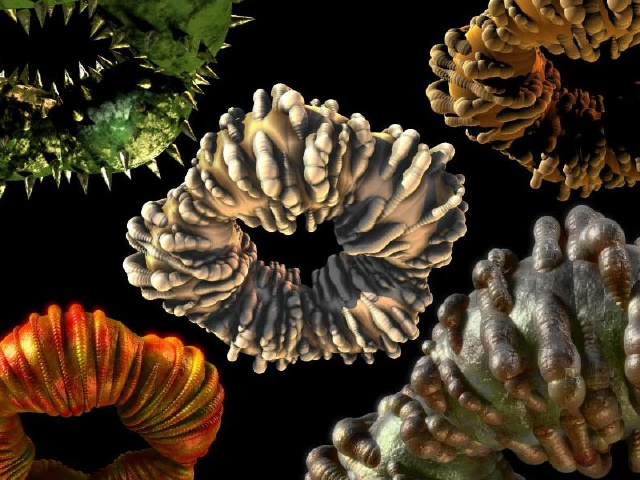 |

Submitted by , posted on 27 June 2001
|
 |

Image Description, by

These pictures were rendered with my own raytracer (with Monte Carlo
extensions). I wrote it just for fun.
The geometry is generated procedually. Some pictures are edited afterwards
to give the bright areas a glow.
I´m a computer science student. For one of my subjects (Renderig and
Animation)
I added RIB loading support. (renderman format). This is partly working.
You can find more pictures at: http://www.kosmokleaner.de/raygallery.html
Sorry, but the explanations are in german.
Now some technical stuff (If you use this for our own work, please mention
my name - and
it would be nice to inform me about your work):
First I experimented with the distribution of the MonteCarlo directions. I
use a spiral with some random values. Take a look at Picture 25 (130min).
Then I developed a post filter. This filter blures all the pixels in a
special range. Distance between two samples is measured with this function:
f = (x1-x2)^2 + (y1-y2)^2 + (z1-z2)^2 + ( (nx1-nx2)^2 + (ny1-ny2)^2 +
(nz1-nz2)^2 )*const.
nx1,ny1,nz1 is the normal at sample 1
nx2,ny2,nz2 is the normal at sample 2
x1,y1,z1 is the position at sample 1
x2,y2,z2 is the position at sample 2
const is a tuneable value.
The blur is only done with the diffuse part of the global illumination (this
is not
perfect, I know ) and should only be done with the same materials.
The results are very good. You can get an image without grain (my shadow
sampler still
generates grain). But the best is: it is very very fast for much better
results. You
have to tune the blur constants, but this could be done in near real time.
It can be easyly extended to do futher sampling at pixels that don´t have
enouth
neighbours for good blurring.
Please forgive my english grammer - I´m from germany.
|
|

